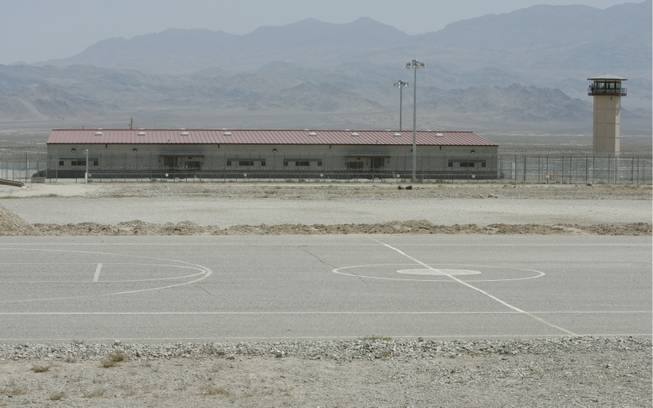Tuesday, May 30, 2017 | 8 p.m.
A proposed private prison ban is in its final version and making its way toward a Senate vote with days left before the legislative session ends.
Assembly Bill 303 came up for a Senate Judiciary Committee hearing on Tuesday. Assemblywoman Daniele Monroe-Moreno, D-North Las Vegas, is sponsoring the measure and says she expects it to reach Gov. Brian Sandoval’s desk in its current form.
Monroe–Moreno worked with Nevada Department of Corrections Director James Dzurenda to amend the bill, giving officials enough time to deal with overcrowded facilities and needed repairs. A retired corrections officer, Monroe–Moreno says two facilities need work.
She said the Southern Desert Correctional Center segregation unit will be refurbished and the Northern Nevada Correctional Center in Carson City needs to be made compliant with the Americans with Disabilities Act.
The Nevada Department of Corrections estimated that the original bill would have cost tens of millions of dollars to implement. The current version allows Nevada to continue sending inmates out of state through the Interstate Compact for Adult Offenders for five years.
“So by allowing five years that gave them enough time to get both facilities to where they needed to be for our citizens to live in and to work in,” Monroe-Moreno said.
Dzurenda told the Senate committee Monday that the hope is to get inmates back into the state. He said contracts will ensure out-of-state inmates have the same offerings as Nevada prisoners.
Monroe-Moreno said that prisoners sent out of state during the five years could end up in a state facility or for-profit prison. She said using that tool temporarily will allow the state to make its facilities humane for the people who live and work there.
“The five-year window gave enough leeway time for that to happen,” Monroe-Moreno said. “As the director said, it’s his hope to bring everyone back in.”
Dzurenda said Tuesday that 200 inmates need to be removed almost immediately from the portion of the Southern Nevada facility that will be refurbished.
“The building foundation is cracking and there’s some sewage issues,” he said.
This refurbishment will cost about $10 million, Dzurenda said, hitting areas needing immediate improvements. He also said officials are in the planning stages for new dormitories at the Carson City facility.
Monroe-Moreno said banning private prisons sends a message that the state has tried this method before and doesn’t want to go down that path again. The Southern Nevada Women’s Correctional Facility was operated by the Corrections Corporation of America when the Nevada Department of Corrections’ inspector general was made aware of substandard supervision and medical treatment of inmates.
Nevada’s state prisons are not currently run by any for-profit industries.
“I may not be in the Legislature 20 years from now and we want to make sure that the next generations of leaders know that we’ve ... learned from this,” Monroe-Moreno said.
The goal is to avoid overcrowding issues that the state is facing now, Monroe-Moreno said.
“Hopefully we don’t have this overcrowding problem again, but that is a bigger issue than the for-profit prison,” she said after Tuesday’s hearing. “It’s working on their parole, and parole hearings, and probation and making sure that the first order of business when someone messes up is not to put them right back into prison but to look at what those wraparound issues were that caused them to mess up.”
In its current form, the bill passed a 38-3 Assembly vote on May 24 and was sent to the Senate. Members of the judiciary committee who heard the bill Tuesday need to approve the bill before the full Senate can consider whether to send it to the governor.
The last day of the 120-day session is June 5.

